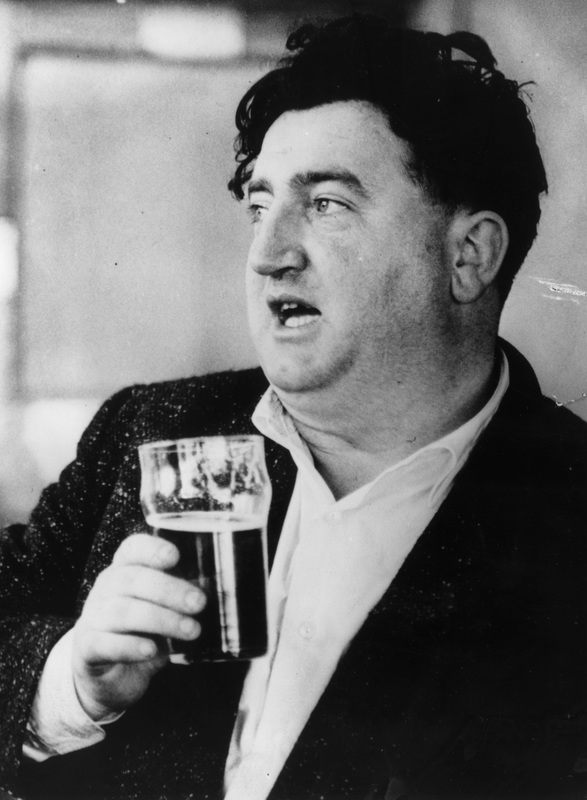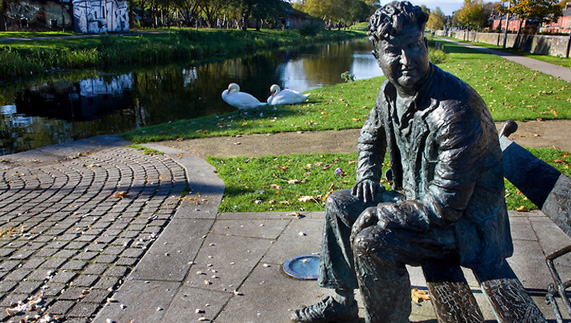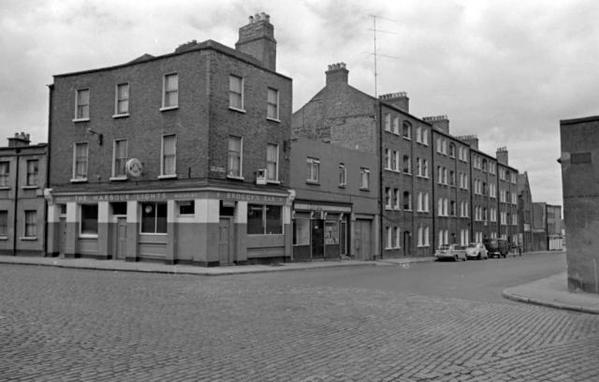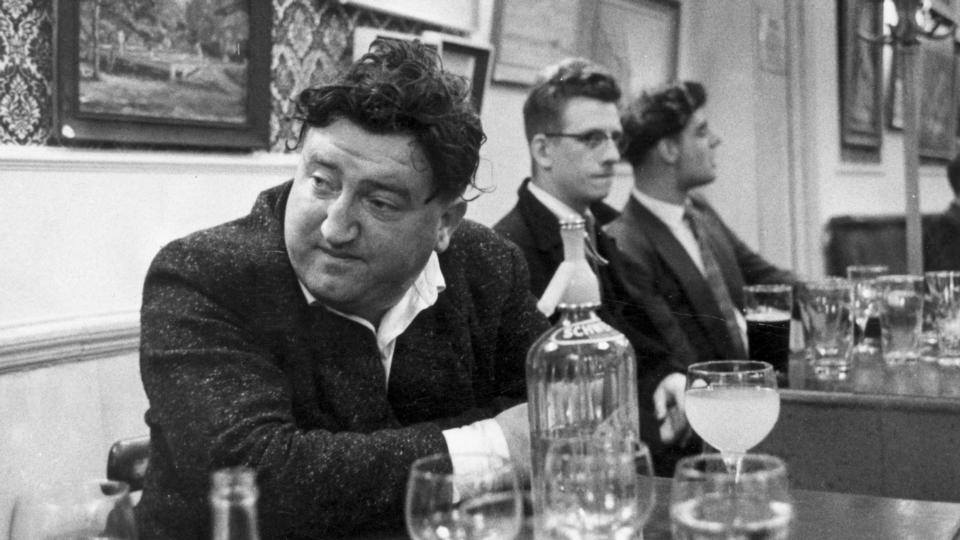Brendan Behan's Dublin
Brendan Francis Aidan Behan (christened Francis Behan)
Born 9th February 1923
Died; 20th March 1964
Brendan was an Irish Republican, poet, short story writer, novelist, and playwright who wrote in both English and Irish. He is widely regarded as one of the greatest Irish writers and poets of all time.
Born in 1923, Brendan Behan was raised at 13 Russell Street in Dublin’s north inner city. He became one of Ireland’s best-known writers and talkers. Having joined the IRA at the age of sixteen, Behan served time in a borstal institution in England and in prison in Ireland. Released from prison as part of a general amnesty in 1946,
Behan moved between Dublin, Kerry and Connemara and spent time in Paris, writing in both Irish and English. He wrote articles for ‘The Irish Press’ and two radio plays for Radio Éireann.
‘The Quare Fellow’, Behan’s first play, was produced in 1954 in Dublin. He married Beatrice ffrench-Salkeld in 1955. In 1958, Behan’s play in the Irish language ‘An Giall’ was performed at Dublin’s Damer Theatre. Afterwards,
‘The Hostage’, Behan’s English language adaptation of ‘An Giall’, met with great success internationally following Joan Littlewood’s production in London in 1958.
‘Borstal Boy’, Behan’s autobiographical novel, was published the same year and became an immediate best seller.
International success and financial reward were followed by an increase in Behan’s drinking problems. Suffering from diabetes, compounded by years of heavy drinking, he died on 20 March 1964
Born 9th February 1923
Died; 20th March 1964
Brendan was an Irish Republican, poet, short story writer, novelist, and playwright who wrote in both English and Irish. He is widely regarded as one of the greatest Irish writers and poets of all time.
Born in 1923, Brendan Behan was raised at 13 Russell Street in Dublin’s north inner city. He became one of Ireland’s best-known writers and talkers. Having joined the IRA at the age of sixteen, Behan served time in a borstal institution in England and in prison in Ireland. Released from prison as part of a general amnesty in 1946,
Behan moved between Dublin, Kerry and Connemara and spent time in Paris, writing in both Irish and English. He wrote articles for ‘The Irish Press’ and two radio plays for Radio Éireann.
‘The Quare Fellow’, Behan’s first play, was produced in 1954 in Dublin. He married Beatrice ffrench-Salkeld in 1955. In 1958, Behan’s play in the Irish language ‘An Giall’ was performed at Dublin’s Damer Theatre. Afterwards,
‘The Hostage’, Behan’s English language adaptation of ‘An Giall’, met with great success internationally following Joan Littlewood’s production in London in 1958.
‘Borstal Boy’, Behan’s autobiographical novel, was published the same year and became an immediate best seller.
International success and financial reward were followed by an increase in Behan’s drinking problems. Suffering from diabetes, compounded by years of heavy drinking, he died on 20 March 1964
"Dublin is a city where there’s familiarity without friendship, loneliness without solitude".
|
|
|
"People who say manual labour is a good thing have never done any".
Lament to Brendan Behan - The Auld Triangle
The RTÉ late Late Show with many familiar faces lamenting Brendan Behan.
The Auld Triangle
Brendan Behan
A hungry feeling, came o'er me stealing
And the mice they were squealing in my prison cell
And that auld triangle, went jingle jangle
All along the banks of the Royal Canal
Oh to start the morning, the warden bawling
Get up out of bed you, and clean out your cell
And that auld triangle, went jingle jangle
All along the banks of the Royal Canal
Oh the screw was peeping and the lag was sleeping
As he lay weeping for his girl Sal
And that auld triangle, went jingle jangle
All along the banks of the Royal Canal
On a fine spring evening, the lag lay dreaming
And the seagulls were wheeling high above the wall
And that auld triangle, went jingle jangle
All along the banks of the Royal Canal
Oh the wind was sighing, and the day was dying
As the lag lay crying in his prision cell
And that auld triangle, went jingle jangle
All along the banks of the Royal Canal
In the female prison there are seventy women
And I wish it was with them that I did dwell
And that auld triangle, went jingle jangle
All along the banks of the Royal Canal
The RTÉ late Late Show with many familiar faces lamenting Brendan Behan.
The Auld Triangle
Brendan Behan
A hungry feeling, came o'er me stealing
And the mice they were squealing in my prison cell
And that auld triangle, went jingle jangle
All along the banks of the Royal Canal
Oh to start the morning, the warden bawling
Get up out of bed you, and clean out your cell
And that auld triangle, went jingle jangle
All along the banks of the Royal Canal
Oh the screw was peeping and the lag was sleeping
As he lay weeping for his girl Sal
And that auld triangle, went jingle jangle
All along the banks of the Royal Canal
On a fine spring evening, the lag lay dreaming
And the seagulls were wheeling high above the wall
And that auld triangle, went jingle jangle
All along the banks of the Royal Canal
Oh the wind was sighing, and the day was dying
As the lag lay crying in his prision cell
And that auld triangle, went jingle jangle
All along the banks of the Royal Canal
In the female prison there are seventy women
And I wish it was with them that I did dwell
And that auld triangle, went jingle jangle
All along the banks of the Royal Canal
"Critics are like eunuchs in a harem; they know how it’s done, they’ve
seen it done every day, but they’re unable to do it themselves".
"I took up writing because it’s easier than house painting".
|
|
|
"The number of people who buy books in Ireland would not keep me
in drink for the duration of the Sunday opening time".
Brendan Behan on the Easter Rising
Behan discusses James Connolly and the 1916 rebellion in Dublin - pausing only to ramble about Chinese socialism - while performing a couple of personal compositions, including his haunting prison ballad (The Auld Triangle) and another song recounting his involvement in an IRA operation at the tender age of 14 (Bonfire on the Border).
The recording was apparently aimed at an American audience and Behan clearly relishes talking of Lenin in connection with the Rising: "I hope the record is not smashed at the point of mentioning his name," he quips.
Perhaps this comment was only half in jest as it was released during the 1950s at the height of the anti-communist hysteria in the US.
I was disappointed to find such a dearth of Behan material on YouTube, so decided to put something together. Hope you enjoy it although it was Brendan who did the hard work, so here's to his memory and an Phoblacht abu!
The recording was apparently aimed at an American audience and Behan clearly relishes talking of Lenin in connection with the Rising: "I hope the record is not smashed at the point of mentioning his name," he quips.
Perhaps this comment was only half in jest as it was released during the 1950s at the height of the anti-communist hysteria in the US.
I was disappointed to find such a dearth of Behan material on YouTube, so decided to put something together. Hope you enjoy it although it was Brendan who did the hard work, so here's to his memory and an Phoblacht abu!
Brendan Behans views on Keats, being a shy man, in the IRA, not liking cops, busking outside theatres, the Irish not being his audience, drinking porter, not being invited to the US, being generally difficult, the Abbey theatre, champagne, and going to the gallows.
Brendan Behan (1923–1964) was an Irish poet, short story writer, novelist, and playwright who wrote in both English and Irish.
Some of Brendans most memorable quotes:
“It's not that the Irish are cynical. It's rather that they have a wonderful lack of respect for everything and everybody.”
“I am a drinker with writing problems.”
“The most important things to do in the world are to get something to eat, something to drink and somebody to love you.”
“There is no such thing as bad publicity except your own obituary.”
“The big difference between sex for money and sex for free is that sex for money usually costs a lot less.”
“Other people have a nationality. The Irish and the Jews have a psychosis.”
“I have never seen a situation so dismal that a policeman couldn't make it worse.”
“One drink is too many for me and a thousand not enough.”
“New York is my Lourdes, where I go for spiritual refreshment ... a place where you're least likely to be bitten by a wild goat.”
“What the hell difference does it make, left or right? There were good men lost on both sides.”
Brendan Behan (1923–1964) was an Irish poet, short story writer, novelist, and playwright who wrote in both English and Irish.
Some of Brendans most memorable quotes:
“It's not that the Irish are cynical. It's rather that they have a wonderful lack of respect for everything and everybody.”
“I am a drinker with writing problems.”
“The most important things to do in the world are to get something to eat, something to drink and somebody to love you.”
“There is no such thing as bad publicity except your own obituary.”
“The big difference between sex for money and sex for free is that sex for money usually costs a lot less.”
“Other people have a nationality. The Irish and the Jews have a psychosis.”
“I have never seen a situation so dismal that a policeman couldn't make it worse.”
“One drink is too many for me and a thousand not enough.”
“New York is my Lourdes, where I go for spiritual refreshment ... a place where you're least likely to be bitten by a wild goat.”
“What the hell difference does it make, left or right? There were good men lost on both sides.”
From a short session of bawdy lyrics and Fenian songs sung by the great playwright, essayist, and Irish republican Brendan Behan. Recorded by Alan Lomax in Dublin in 1951, presumably at Radio Eireann.
Brendan Behan speaks of a piece of music called "An Coolin"



